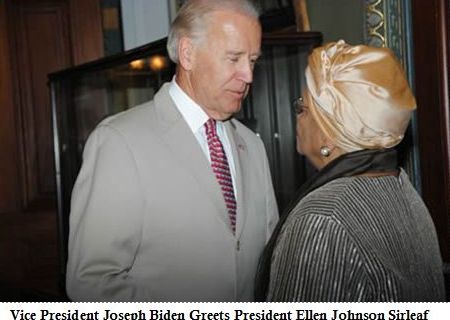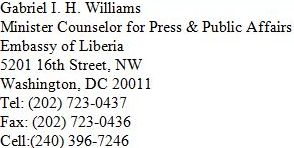
The President of the Republic of Liberia, Her Excellency Madam Ellen Johnsons Sirleaf, paid an official visit to Washington, D.C. from June 6-12, 2012, during which she held a series of meetings with senior United States officials, including Vice President Joe Biden, Secretary of State Hillary Clinton, and key Congressional leaders, among others. Click to see Pictures from Visit =====>
President Sirleaf’s engagements in Washington began early June 7 on Capitol Hill with a series of meetings with key Congressional Committees and influential Congressmen and Congresswomen.
The Liberian leader was accompanied by four Liberian Legislators – Senators Isaac Nyenebo and Geraldine Doe-Sheriff, and Representatives Wesseh Blamo and George Mulbah – and Liberia’s Ambassador to the United States, His Excellency Jeremiah Sulunteh.
At the U.S. Senate, President Sirleaf and her delegation met with members of the Senate Foreign Relations Committee headed by Senator John Kerry, with Ranking Member Senator Richard Lugar. The 17-member Committee held an hour-long meeting with the President and party, during which United States-Liberia relations, the current drawdown of the United Nations Mission in Liberia, the financial crises in Europe, and other global issues topping the discussion. The delegation also met with Senator Patrick Leahy and Ranking Member Senator Lindsay Graham of the Senate Appropriations Subcommittee on State and Foreign Operations.
At the House of Representatives, President Sirleaf and party met with the House Foreign Affairs Committee headed by Congresswoman Ileana Ros Lehtinen, with Ranking Member Congressman Howard Berman and the House Appropriations Subcommittee on State and Foreign Operations headed Representative Kay Granger, with Ranking Member Representative Nita Lowey.
Meetings were also held with the House Democracy Partnership headed by Co-Chairs Congressmen David Dreir and David Price; the Democratic Leadership headed by House Minority Leader, Representative Nancy Pelosi; Congressman Adam Smith, Ranking Member of the House Armed Services Committee; and the Members of the Congressional Black Caucus headed by Congressman Emanuel Cleaver, II.
President Sirleaf’s meetings with the different Congressional Committees were aimed at updating the Members on Liberia’s success during the administration’s first term, convey gratitude and appreciation to the U.S. Congress for the level of support to Liberia; and to encourage the Congress to maintain and sustain U.S. engagement with Liberia.
During the meeting with Vice President Biden, the two discussed United States-Liberia relations, and the strengthening of that relationship through the establishment of a Bi-National Commission; the drawdown of the United Nations peacekeeping force in Liberia, and the corresponding need to build up Liberia’s security forces, particularly the Police and Immigration; the country’s successes and challenges, among the latter being the need for infrastructure, especially electricity, to promote development, and to address the problem of youth unemployment.
President Sirleaf’s State Department meeting with Secretary Clinton touched on the same issues as discussed with Vice President Biden, in which she also spoke of her second-term priorities, especially making the hydro plant operational; Liberia’s new three-year, medium-term budget; the proper use of Liberia’s natural resources for the benefit of all Liberians; and the need to review the UN sanctions regime on Liberia regarding frozen assets and travel ban, among others.
The President and her delegation also met with officials of the Millennium Challenger Corporation (MCC), for discussion about what Liberia needs to do in order to qualify for Compact status, under which the country will receive infrastructural support. Currently, Liberia has met the requirements for inflation, gender balance in economic development, access to credit, health expenditures, natural resource protection, political rights, civil liberties, freedom of information, and control of corruption.
President Sirleaf also visited the Headquarters of the U.S. Peace Corps, where she spoke at the 2012 Loret Miller Ruppe Speaker Series. In her address, President Sirleaf acknowledged the important role the Peace Corps played in Liberia’s past development and post-conflict rebuilding process.
The Chief Executive earlier participated in a round-table Conference of the Frontiers in Development Forum, sponsored by the U.S. Aid for International Development (USAID). She also delivered a keynote address at the USAID forum, during which she named waging war against poverty and inequity based on broad-based inclusive growth, reforming institutions and building new ones where they do not exist, preserving partnerships, and designing interventions that strengthen local systems and empowers people, as four key elements that stand out as the foundation for post-conflict countries to emerge into stable and prosperous countries.

